Our pick of spinout technologies that are breaking new ground in plastics recycling, data storage, photonics, semiconductor materials and decoding the genome.

For the past year, Global University Venturing has tracked university spinouts globally that have raised or are raising funding up to series A as part of our new Spinout Tracker.
Of of the hundreds of spinouts that secured financing this year, we picked 12 that stand out for their breakthrough technologies that aim to solve the biggest challenges facing society.
The technologies span cleantech, materials science, circular economy, genome sequencing and artificial intelligence. Some are at the earliest stage of company formation and commercialisation, and provide a glimpse of the kind of deep tech breakthroughs shaping the future.
Biomemory – DNA storage technology
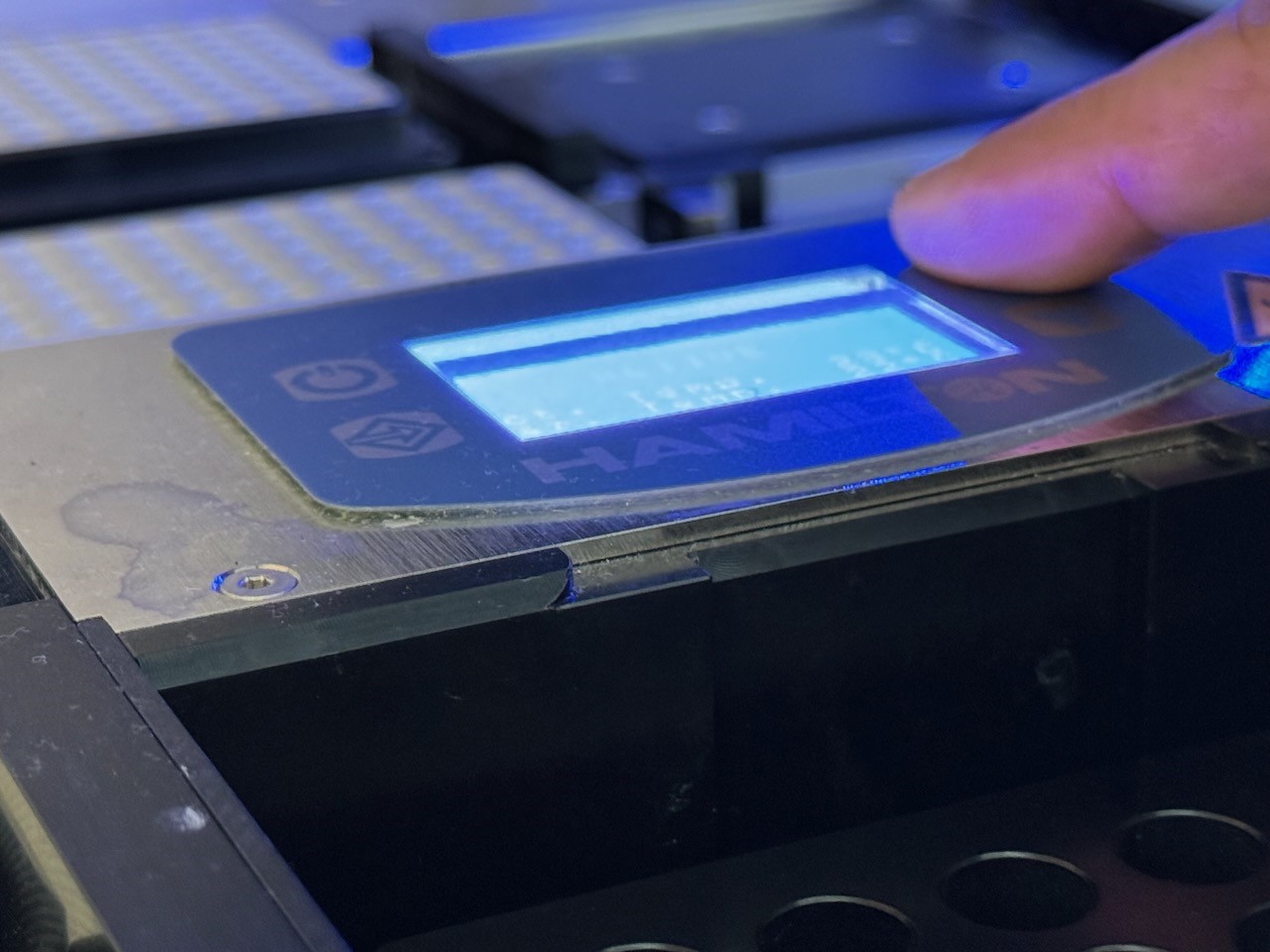
Storing the vast amounts of data produced daily requires large amounts of energy and space. Biomemory aims to solve this challenge using DNA storage technology.
Founded in 2021 as a spinout from France’s Sorbonne University and the Centre Nationale de la Recherche Scientifique, a French state research organisation, Biomemory has developed technology that produces long, bio-sourced, biocompatible and bio-secure DNA fragments that can be stored as inert polymers for thousands of year with no need for energy.
It claims the technology has the potential to store all of humanity’s data in the space of a single 19-inch data centre rack.
The spinout offers an end-to-end solution, from DNA synthesis, data encoding, decoding to secure storage.
In December 2024, it raised $18m in a series A funding round led by French investment company Credit Mutuel Innovation. Other investors include Blast, a deep tech fund managed by Bpifrance on behalf of the French government, Paris Business Angels, Sorbonne Venture, Adnexus, Prunay, Next Sequence and Accelerem.
Terria – 3D maps and digital twin technology

The build-out of renewable energy projects and the transmission lines to bring that energy onto the grid is essential if countries are to meet goals to reduce greenhouse gas emissions. But public opposition to such projects can be strong in areas where this infrastructure needs to be built.
Geospatial data company Terria, spun out of the Commonwealth Scientific and Industrial Research Organisation, an Australian government agency, aims to educate the public on the impact of renewable energy projects with its advanced 3D maps and spatial digital twins. Until now, this process has been constrained by 2D maps.
Its platform integrates thousands of data layers into interactive maps and 3D visualisations, enabling governments, businesses and communities to model real-world scenarios and plan projects.
The technology has multiple applications in industry. Its digital twin technology can increase productivity and lower costs in the construction sector, for example. In December 2024, the venture was backed by seed investment firm Main Sequence after spinning out as an independent company.
Clyde Hydrogen – cheap and plentiful green hydrogen

Hydrogen is one of the most promising alternatives to fossil fuels, with the potential to decarbonise sectors that are hard to electrify, such as heavy industry, shipping and aviation. But making green hydrogen from fully renewable resources is a big challenge because of the large costs of producing enough renewable energy to power electrolysers in the hydrogen-making process.
Clyde Hydrogen, a spinout from the University of Glasgow, in the UK, has developed a decoupled electrolysis technology that allows water to be split into hydrogen and oxygen in separate places and at different times and rates. The decoupled system has a unique liquid mediator that allows the system to charge up with hydrogen while there is no hydrogen demand and then deliver high pressure hydrogen when needed. When there is no renewable energy available, hydrogen can still be produced from the charged liquid mediator.
The technology is touted as safer than traditional electrolysis because there is no possible of hydrogen and oxygen mixing, which can cause an explosion. It can also be scaled more easily and is cheaper to build and run.
The company is raising $6.3m in a seed round. The University of Glasgow and pre-seed venture capital firm Zinc are backers. It also has grants from the Scottish government’s Hydrogen Innovation Scheme and the Net Zero Technology Centre.
Ookuma Diamond Device – solving data transmission bottlenecks
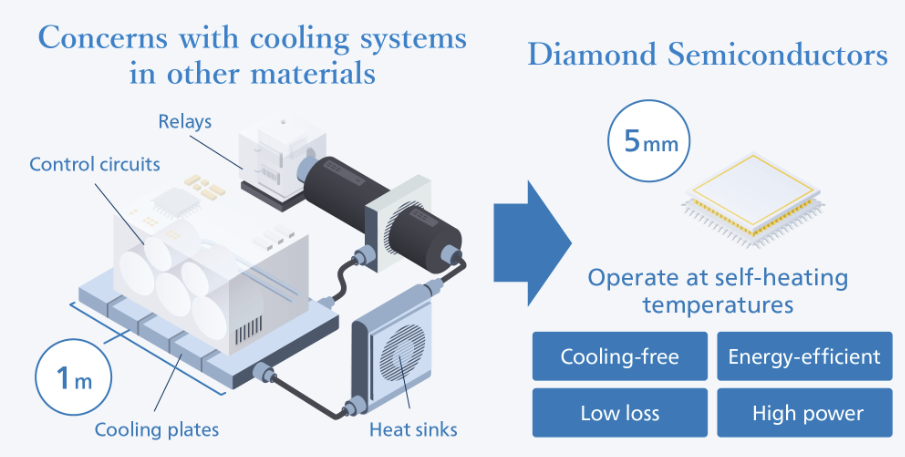
The explosive growth in high-speed data communications puts increasing pressure on existing computing infrastructure. A spinout from Japan’s Hokkaido University aims to solve the bottlenecks with its diamond semiconductor technology.
Diamond computer chips can use large amounts of electricity efficiently, surpassing materials used in conventional semiconductors. More traditional chip materials require large cooling systems to prevent them from breaking down due to self-heating. Diamond semiconductors eliminate the need for cooling. They can operate in high temperatures and radioactive environments.
They can also meet the data demands of next-generation services such as autonomous driving, blockchain, artificial intelligence and cellular network technology that goes beyond 5G.
Originally founded to help with the decommissioning of the Fukushima Daiichi nuclear power plant after its reactors melted down following a tsunami in March 2011, Ookuma Diamond Device is seeking to sell its technology to satellite and radar industries, and mobile phone base stations.
In October 2024, it raised $27m in a funding round backed by investors Globis Capital, aStart, Japan Post Bank Spiral Regional Innovation Fund and SMBC Capital.
Carbogenics – sequestering carbon for thousands of years
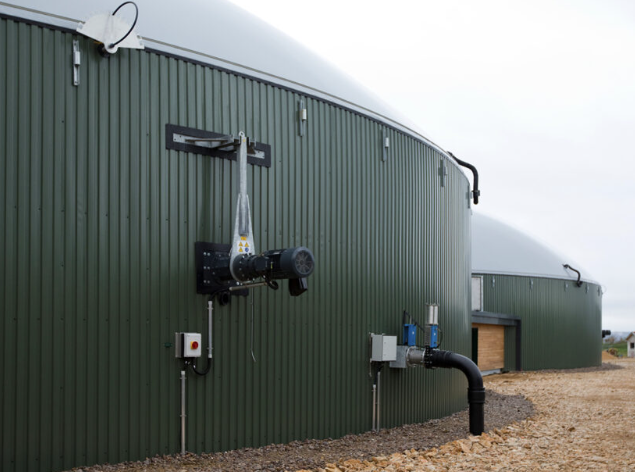
This University of Edinburgh spinout produces a sustainable carbon material called biochar, which has a range of applications in industry and agriculture, such as improving the efficiency of anaerobic digestion and wastewater treatment.
Most biochars are made from virgin materials such as wood. The spinout makes biochar from waste biomaterials such as difficult-to-recycle paper and cardboard that would otherwise go to landfills or be incinerated.
The biochar, produced through pyrolysis, cannot be easily broken down by microrganisms. This makes it useful for sequestering carbon for thousands of years.
Carbogenics raised $600,000 in a funding round in December 2024. Backers include Green Angel Investors and Kaplack Ventures, an early-stage VC firm financing businesses that decarbonise industry.
Sora Fuel – cheap and abundant sustainable aviation fuel
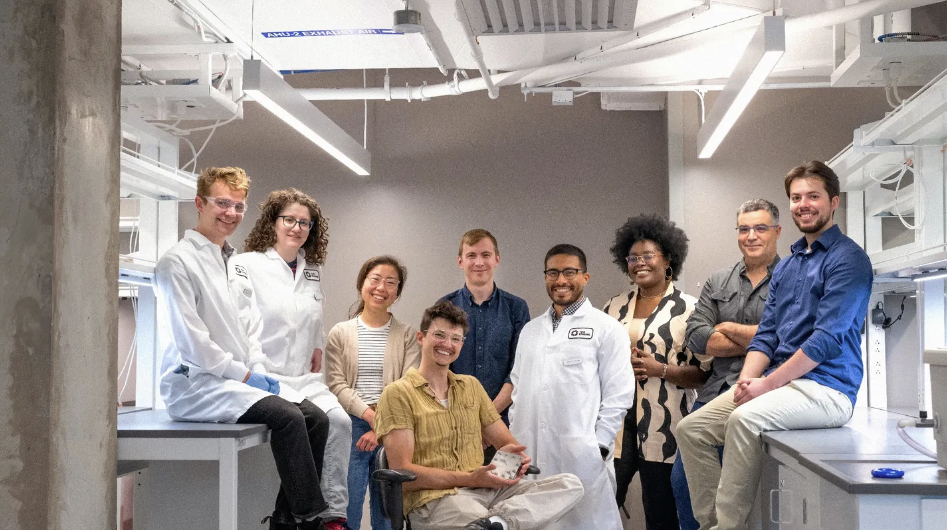
The airline sector is one of the hardest industries to decarbonise due to the challenges of scaling sustainable aviation fuel to the extent that is needed to meet demand.
Sora Fuel, a spinout from the University of British Columbia, Canada, is developing technology that addresses the issues of affordability and availability by making jet fuel from just air, water and renewable energy.
It does this by combining carbon capture and utilisation in a single process. The technology uses a liquid bicarbonate electrolyser to integrate capture and conversion of CO2 into one step. Operating in a closed-loop system that uses water and renewable electricity to produce syngas, it claims it can deliver CO2 from the atmosphere to its electrolyser at less than $25 a ton.
In August 2024, it raised $6m in a seed round backed by deep tech VC firm Engine Ventures and seed stage investor Wireframe Ventures.
Forefront RF – tackling miniaturisation of electronics

The multi-billion-dollar mobile phone market has embraced miniaturisation, but this has made it difficult for manufacturers to fit all of the components needed on printed circuit boards.
University of Bristol spinout Forefront RF aims to simplify radio front end designs in smartphones, wearables and other IoT devices with a tunable duplexer technology that frees up space on printed circuit boards. The technology replaces fixed frequency filters that take up a lot of room.
The UK-based company’s simplified radio frequency design hardware means manufacturers can reduce supply chain waste and lower production costs.
In November this year, the spinout raised £16m in a series A round, backed by existing investors BGF and Foresight Group. New investors are Octopus Ventures and Cambridge Innovation Capital. It will use the funding to expand into the cellular-enabled smartwatch market.
Swisspod – ultrafast, carbon-neutral transportation
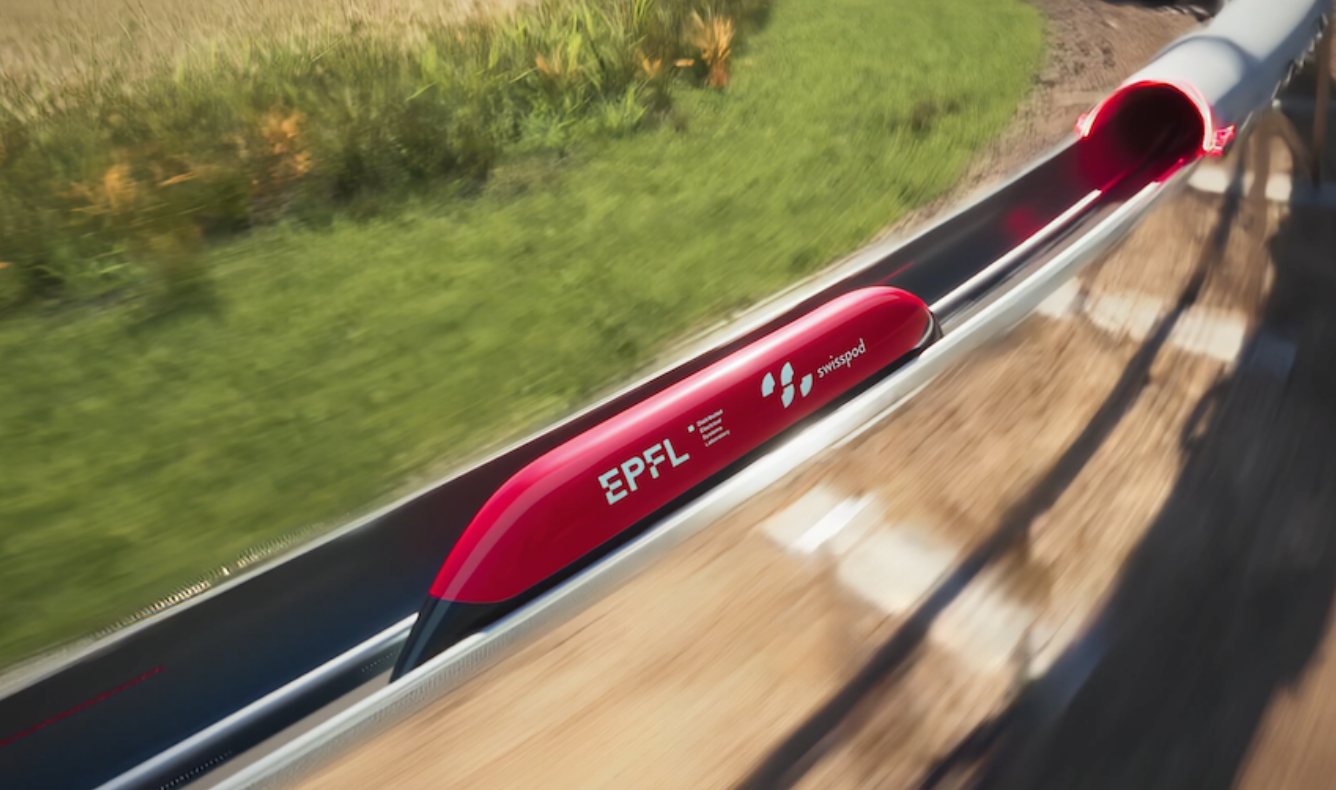
The Swiss spinout aims to connect every large city using carbon-neutral, energy-efficient and high-speed hydroloop technology. The company, spun out of Swiss Federal Institute of Technology in Lausanne and the School of Engineering and Management in Vaud Canton, is developing a high-speed transportation system using linear induction motor technology that is a key part of its hydroloop propulsion system
Swisspod claims the technology will be capable of transporting passengers and cargo from Geneva to Zurich, a distance of 170 miles, in only 17 minutes, or New York City to Washington, D.C. in just 30 minutes, faster than a plane with a fraction of the carbon footprint.
The company is building an operational testing facility in Europe that has funding from Innosuisse, a Swiss government innovation agency. It is also building hydroloop infrastructure in Colorado, US. In July this year, Swisspod closed a pre-series A round for an undisclosed sum. Backers include Charlie Holding, E-INFRA Group and Polysys Industries.
Oriole Networks – using light to power AI chips
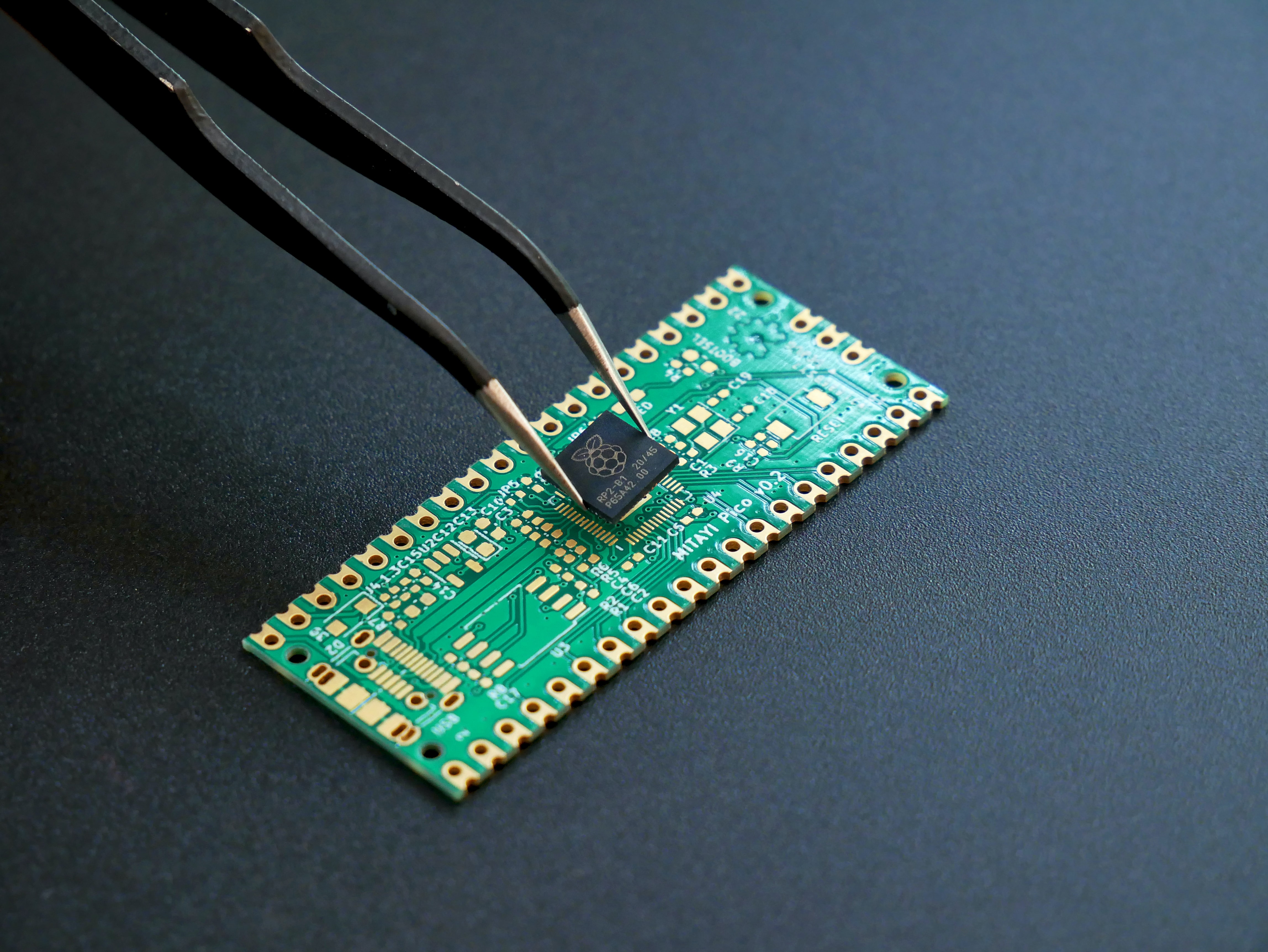
Artificial intelligence will require vast amounts of energy to power data centres and will put increasing strain on electricity grids. Oriole Networks, a spinout from University College London, in the UK, aims to solve these bottlenecks with its AI chips based on photonics technology.
The technology uses light instead of more traditional silicon material to create networks of AI chips that have combined processing power. The company claims the technology can train large language models a hundred times faster than today’s computer chips while consuming a fraction of the power. This allows algorithms to run with much lower latency.
In October this year, it raised $22m in a series A round led by venture capital firm Plural with the participation of existing investors UCL Technology Fund, XTX Ventures, Clean Growth Fund and Dorilton Ventures.
Lucid Genomics – decoding the entire genome

Only 2% of data from genome sequencing is analysed by geneticists. Advances in artificial intelligence are enabling 100% of genetic data to be explored, which can lead to the diagnosis of genetic diseases, the development of new drugs and the improvement of precision medicine.
Lucid Genomics, a spinout from the Charite University Hospital in Germany and the Max Planck Institute for Molecular Genetics, uses AI-driven algorithms to analyse all of the DNA dataset at low cost. Its aim is to decode accurately 100% of DNA data from whole genomes.
In June this year, the company received $1.45m in pre-seed funding from Caesar Ventures, BIF Partners and MPF Accelerator.
Azul Energy – electrification without the need for rare metals
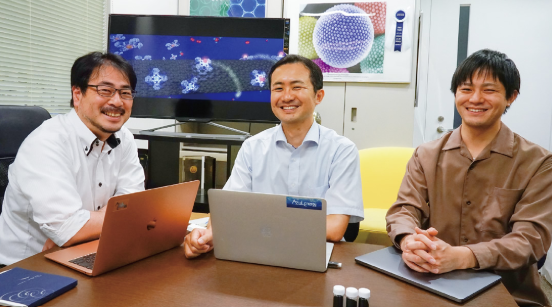
Rare earth metals such as platinum and iridium are essential elements in the electrification of transportation and industry. But they are scarce and costly to source. Azul Energy, a spinout from Japan’s Tohoku University, has developed a non-rare earth metal catalyst that can be used in electrochemical reactions for clean energy processes such battery storage, water electrolysis and synthetic fuel production.
The technology is inspired by heme in hemoglobin, which has biological functions that mimic electrochemical reactions. The Azul catalyst can be manufactured using conventional chemical processes and it claims the production cost is 10 times lower than platinum catalysts.
In February 2024, the spinout raised ¥475m ($4.1m) in a series A funding round led by Spiral Capital with participation from Tohoku University Venture Partners, JMTC Capital, Mitsubishi UFJ Capital and Governance Partners.
Cyclize – recycling plastics in the circular economy
Plastic waste is hard to recycle and is an ecological hazard in waterways and oceans. German spinout Cyclize aims to turn waste plastics into useful products for the circular economy.
A spinout from the University of Stuttgart, Cyclize has created plasma technology that turns plastics into new chemicals, which can be used to create new products. The technology can use carbon as a feedstock, which also helps companies to meet carbon emissions reduction goals.
The intermediate chemical that is produced through the technology is syngas, a mixture of hydrogen and carbon monoxide. This can be used in the manufacturing of adhesives and paints as well as fuel and methanol. It can also be used to replace natural gas or propane.
In February this year, the spinouts secured €4.75m ($5m) in seed funding. The round was led by early-stage venture capital firm UVC Partners, with participation from public-private seed investor High-Tech Gründerfonds, Aurum Impact, UnternehmerTUM Funding for Innovators.









